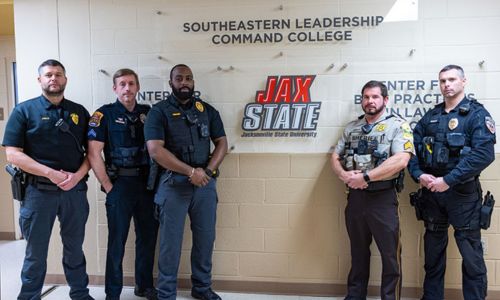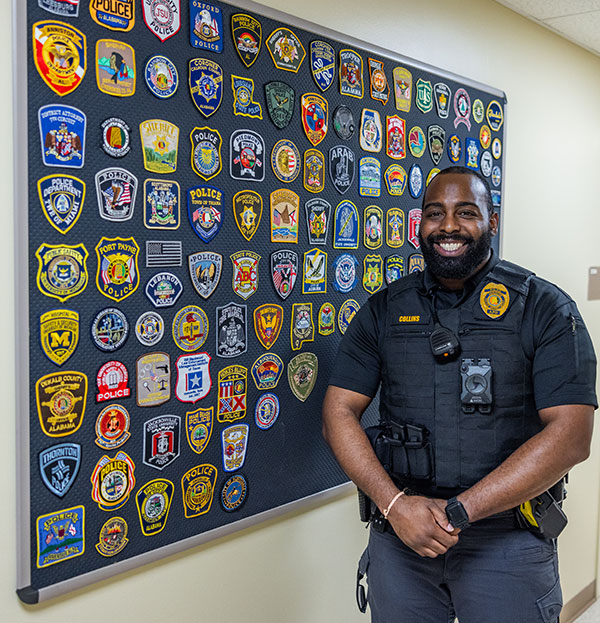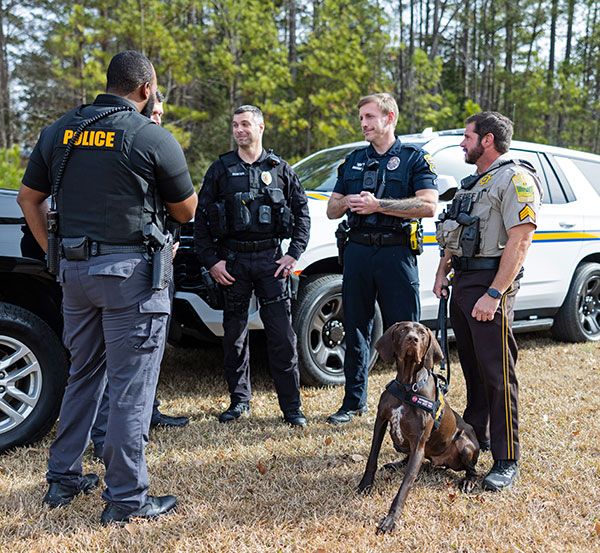Jacksonville, AL – In a milestone for law enforcement training, Jacksonville State University (JSU) proudly unveiled the Southeastern Leadership Command College on Monday, at JSU’s McClellan campus. This distinguished addition complements existing programs like the Center for Best Practices in Law Enforcement and the Center for Applied Forensics.
The grand opening witnessed the presence of notable figures, including State Attorney General Steve Marshall and other esteemed state officials in law enforcement. Acknowledging the distinctive challenges of law enforcement, Marshall commended JSU for its dedication to cultivating the talents of seasoned professionals to mentor the next generation of law enforcement officers.

Kaleb Littlejohn, Director of the Center for Best Practices in Law Enforcement, shed light on the structure of the Command College. This 9-week program is tailored for current and aspiring law enforcement leaders, specifically those holding the rank of sergeant or higher. It covers essential leadership aspects such as budgeting, conflict resolution, emotional intelligence, and addresses social, environmental, and legal considerations.
A unique aspect of the coursework, as highlighted by Littlejohn, is the emphasis on nutrition, recognizing the profession’s need to address the health and well-being of law enforcement officers. Describing the Command College as a state version of the FBI National Academy, Littlejohn stressed the imperative need for leadership training, given the turnover rate of police chiefs in the state.

Local police chiefs, including Oxford Police Chief Bill Partridge, Anniston Police Chief Nick Bowles, and Jacksonville Police Chief Marcus Wood, were present at the event. Chief Bowles expressed optimism, stating, “It’s going to be a good resource to train future leaders in law enforcement to manage the pinnacles and pitfalls of the industry.”
Chief Partridge spoke to the Calhoun Journal and stated, “Jax State is the gold standard for law enforcement training in Alabama. Now with the opening of the Southeastern Leadership Command College they will be training the future of law enforcement.”
Jacksonville University Chief of Police, Michael Barton spoke to the Calhoun Journal and said, “The Southeastern Leadership Command College is an exciting opportunity for law enforcement in Alabama. With the average tenure of only three years for police chiefs in the State, this training is an excellent resource to help equip these public safety leaders to do the job their officers and jurisdictions depend on them for.”
JSU President Don C. Killingsworth, Jr. echoed this sentiment during the ribbon-cutting ceremony, emphasizing the university’s over 50-year commitment to police education and training. The JSU Board of Trustees, represented by Chair Randy Jones, reaffirmed its commitment to making the program a national gold standard for law enforcement training.

The Southeastern Leadership Command College expands on JSU’s existing law enforcement programs, offering professional development for senior leaders and preparing mid-level officers for leadership roles. Housed on the grounds of the former Fort McClellan Base, it joins fellow programs like the Center for Applied Forensics, the Center for Best Practices in Law Enforcement, and the Alabama Investigator Academy.
Alabama Attorney General Steve Marshall applauded JSU’s impact, not only on law enforcement but on communities during the ribbon-cutting. He highlighted JSU’s support for victims of violent crimes and its unwavering commitment to justice.
Command College is currently accepting enrollments for its inaugural cohort, set to commence in March. The program, focusing on general management and leadership principles, is open to Alabama police officers holding the rank of sergeant or above and is free for sworn law enforcement officers in the state.
For additional information, interested parties can contact the Center for Best Practices in Law Enforcement at CBPLE@jsu.edu. The Southeastern Leadership Command College at Jacksonville State University marks a significant stride in ensuring the continuous professional development of law enforcement leaders, contributing to safer communities statewide.












